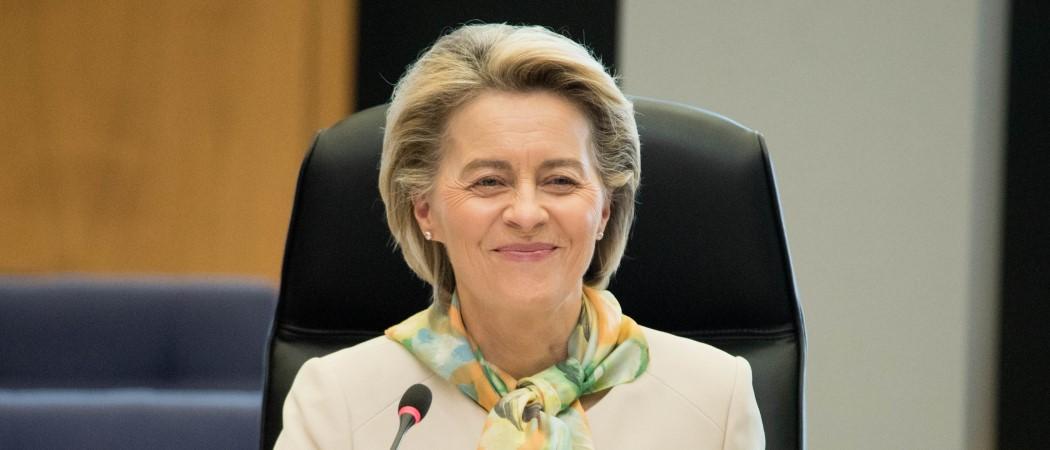After US President Joe Biden kicked off with a renewed commitment to international cooperation in science and technology, the European Commission rehashes proposal to form transatlantic tech alliance to counterbalance the rise of China

EU Commission president Ursula von der Leyen. Photo: EU Commission.
EU Commission president Ursula von der Leyen renewed a proposal to set up transatlantic technology alliance in a phone call with US president Joe Biden on Friday.
The Commission wants the Transatlantic Trade and Technology Council to allow the EU and the US to jointly address global innovation issues and set joint standards on technologies such as 5G mobile networks, artificial intelligence and data flows, areas in which China is the main global competitor.
“I see this as the key forum to build our transatlantic technology alliance,” von der Leyen said.
The EU presented the proposal to US leadership towards the end of Donald Trump’s administration but did not receive any feedback. As Biden kicked off his mandate with a renewed commitment to international cooperation in science and technology and rebuilding bridges burnt by his predecessor, the Commission stepped in to refresh the proposal.
In a joint statement published in January, the industry association Business Europe and the US Chamber of Commerce, said a new technology council would help the EU and the US strengthen their technological and industrial leadership. “Such a council could forge transatlantic consensus across issues ranging from artificial intelligence, data flows and cybersecurity, as well as cooperation on regulation and standards,” they said.
While lobby groups support the proposal and want to be involved in setting it up, it remains unclear how the US will react, and how it will be put into practice, if accepted. “We are at the beginning of the process,” said Luisa Santos, deputy director general, in charge of international affairs at Business Europe. “We need to see first if there is a positive reaction from the US side and then we could put in place details how this is going to be operationalised.”
Rebuilding burnt bridges
Under the previous administration, the US took a lot of unilateral decisions which damaged relations with the EU. Unless the US and the EU can coordinate policies in high tech and also in cross-cutting areas like supply chains and foreign investments, companies on both sides on the Atlantic will continue to be exposed to the advent of Chinese influence, Santos said. “It would be good if we coordinate.”
Josep Borrell, the EU’s high representative for foreign affairs previously said the proposal is not about siding with the US to outflank China and prevent it from dominating important economic and technological sectors. “That would be a crazy objective. We need China,” he said.
In a paper published in December, the Commission said Washington and Brussels "must work closely together on solving bilateral trade irritants" and protect EU-US commerce, which accounts for a third of world trade.
China is a major trading partner for the EU and the US and is poised to strengthen its leadership in technology. In addition, China is the torchbearer of a rival system that does not value democracy and the independence of the private sector. “We need an alternative to the Chinese model,” said Santos. “The way the standards will be set by China will not meet the needs of our system.”
At the end of December, the EU signed an investment agreement with China, which could pave the way for a more balanced relationship with the communist nation. At the moment, Chinese companies have open access to the EU market, but the relationship is not reciprocal. According to Santos, the investment deal will not put EU and Chinese companies on equal footing, but it will “improve the existing imbalance.”
Renewed commitment on climate and health
After Biden took office in January, the US rejoined the Paris climate accord, a global commitment to significantly reduce carbon emissions and limit global warming to 1.5 degrees Celsius compared to pre-industrial levels. Biden’s predecessor caved into pressure from conservative groups and the coal industry and pulled the US out in 2017.
“I warmly thanked President Biden for re-joining the Paris Agreement,” said von der Leyen.
Biden and Von der Leyen will meet to discuss the issue at the Earth Day Climate Summit convened by the US administration. The two leaders will also meet at the United Nations climate conference in Glasgow in November. To prepare for the Glasgow conference, Biden’s special envoy for climate John Kerry is in Brussels this week to meet the Commission.
Von der Leyen has also invited Biden to the Global Health Summit in Rome to discuss how the EU and US can work together to better prepare the world to face future pandemics and improve health security.





 A unique international forum for public research organisations and companies to connect their external engagement with strategic interests around their R&D system.
A unique international forum for public research organisations and companies to connect their external engagement with strategic interests around their R&D system.